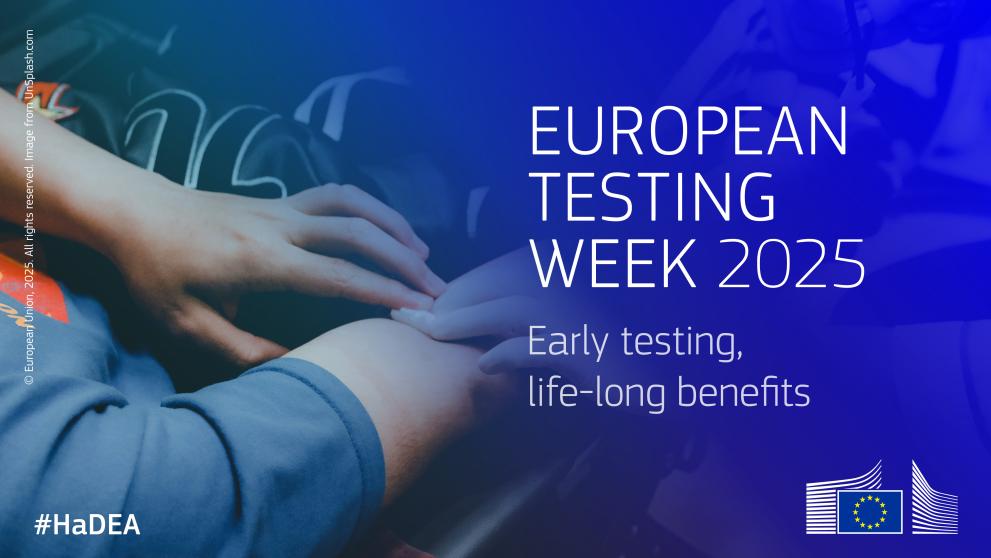
Twice a year, the campaign around the European Testing Week encourages organisations and institutions throughout Europe to increase testing efforts and promote awareness of the benefits of earlier hepatitis and HIV testing.
EU countries have made substantial progress towards reaching the United Nations’ Sustainable Development Goal 3, ‘To ensure healthy lives and promote well-being for all at all ages’, and its specific target of ending HIV/AIDS, tuberculosis and other communicable diseases. However, significant differences and inequalities that prevent further progress towards these targets still exist within the EU, namely between countries, and between and within the affected communities.
Take a look at EU-funded projects managed by HaDEA that are working to improve testing in the EU.
EU4Health
The CORE project (Community Response to End Inequalities) aims to reduce disparities between countries and communities by promoting, strengthening and integrating proven community responses reaching “hard to reach” populations.
To strengthen community responses, CORE is using capacity-building, networking, and the exchange of good practices and innovative approaches, including data monitoring and reporting.
The project is building on an intensifying collaboration between regional networks and national and local organisations of people living with HIV, key populations, and service provider organisations. It uses, adapts, and disseminates existing national, regional, and global good practice approaches and tools from across key populations and disease areas, and provides platforms for exchange.
The project VH-COMSAVAC (Multi-country Viral Hepatitis COMmunity Screening, Vaccination, and Care) has worked to improve viral hepatitis prevention and care among migrants and refugees in Spain, Italy and Greece, engaging community workers in order to effectively reach out to the target groups. The project developed a community-based screening model using simplified diagnostic tools and performed an economic evaluation which proved the model to be both feasible and cost-effective. As a result, 2043 migrants and refugees have been screened throughout the project. Depending on the outcomes of the screening, they have been linked with public healthcare system for further treatment or vaccination.
Horizon Europe
The BREATHFORDX project (Establishing Exhaled Breath Aerosol (XBA) sampling for diagnosis and screening of respiratory infections) is developing a novel testing approach to diagnosing and screening respiratory infections by analysing exhaled breath aerosols (XBA). This testing technique could offer a non-invasive, quick, and reliable method to detect diseases such as tuberculosis (TB) and other respiratory infections, revolutionising the way respiratory infections are diagnosed. BREATHFORDX will compare different breath aerosol sampling devices and test their effectiveness in detecting TB, using the Respiratory Aerosol Sampling Chamber (RASC) for validation. A feasibility study will examine how well the breath sampling devices work in real-world settings, such as among migrant populations, to screen for TB and respiratory infections. BREATHFORDX results could significantly improve early detection and treatment outcomes, reducing the burden on healthcare facilities, potentially being adapted to other infectious diseases.
The UNDINE project (The human genetic and immunological determinants of the clinical manifestations of SARS-CoV-2 infection: Towards personalised medicine) is focused on understanding why people have different reactions to COVID-19 by studying their genetic and immune system differences. The project is identifying human genetic and immunological factors that influence how severely a person is affected by COVID-19 in order to develop personalised treatment plans, tailored specifically to individual patients. The involved researchers are studying patients and people who seem naturally resistant to the virus and are examining how genetic differences affect the immune response to the virus. The project is also developing a test to detect specific antibodies that could indicate a stronger reaction to COVID-19.
The EPIVINF project (Epigenetic regulation of host factors in viral infections) seeks to explore how viral infections like HIV and SARS-CoV-2 change the host's epigenetic regulations, which are mechanisms that alter gene activity. Understanding these changes can help predict disease severity, identify new treatment targets and develop personalised therapies. So far, experiments are examining how these epigenetic changes affect people’s responses to HIV and COVID-19 vaccines. These changes can serve as biomarkers, which are measurable indicators of the presence or severity of a disease, potentially leading to new diagnostic tests able to detect infections earlier or assess their severity or to predict an individual's susceptibility to severe disease
Background
EU4Health is the fourth and largest of the EU health programmes. The EU4Health programme goes beyond an ambitious response to the COVID-19 crisis to address the resilience of European healthcare systems. The programme provides funding to national authorities, health organisations and other bodies through grants and public procurement, contributing to a healthier Europe. HaDEA manages the vast majority of the total EU4Health budget and implements the programme by managing calls for proposals and calls for tenders.
Horizon Europe is the research and innovation programme of the EU for the period 2021-2027. The aims of Cluster 1 ‘Health’ include improving and protecting the health and well-being of citizens of all ages by generating new knowledge, developing innovative solutions and integrating where relevant a gender perspective to prevent, diagnose, monitor, treat and cure diseases. Horizon 2020 (H2020) was the EU’s multiannual funding programme between 2014 and 2020.
Details
- Publication date
- 23 May 2025
- Author
- European Health and Digital Executive Agency
- Programme Sector
- Health
- Programme
- Horizon Europe Cluster 1: Health
- Tags
- Health preparedness
- HealthUnion
- Public health
